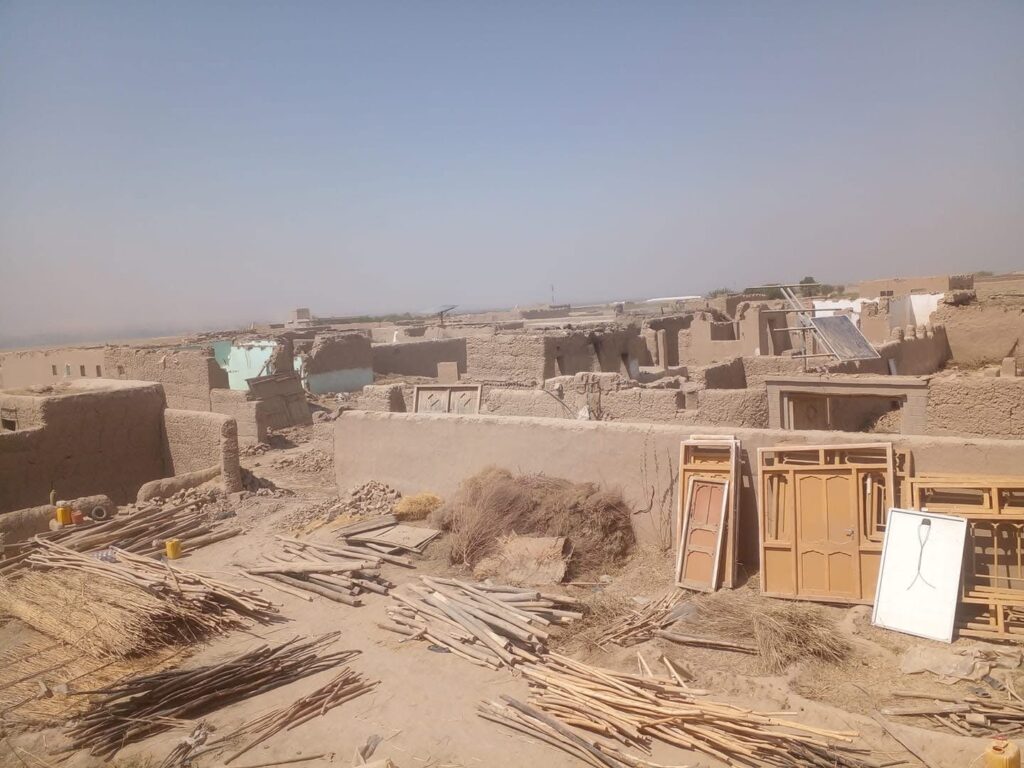
Report by Obaidullah Ahmadi
Demolition of 1,000 Homes in Aliabad, Kunduz Leaves Hundreds of Families Homeless
Aliabad district in Kunduz province is currently witnessing a humanitarian disaster.
Local sources told IntelMedium that Taliban fighters recently demolished around 1,000 residential houses in the newly established village of Raghestan, located in Pul-Khishti area of the district, and forcibly expelled hundreds of families from their homes.
According to residents, Taliban militants clashed with people during the demolition, beating dozens of men, youths, women, and children.
Villagers say they had built their homes with money earned from daily labor and had legally purchased the land with local deeds.
One resident told IntelMedium:
“We bought this land from the locals, using money we earned through hard labor in the cities. No one got this land for free. People here don’t even have enough food for today. They are poor and hardworking.”
In response to the demolitions, residents of Raghestan protested, chanting “Death to the Taliban government,” and blocked the main Kunduz–Kabul highway. However, the Taliban violently suppressed the demonstration.
One protester said:
“We bought this land and have lived here for four years. Now the Taliban say the houses must be demolished to build a terminal. They gave us neither compensation nor alternative land.”
Residents accuse the Taliban of providing land and shelters to Afghan returnees expelled from Pakistan, while destroying the homes of locals.
They ask:
“Why are lands given to returnees from Pakistan, while the houses of poor, struggling locals like us are demolished? Why is alternative land not provided for our destroyed homes?”
Locals emphasize that the lands in question were allocated for township development during the reign of King Zahir Shah and were later used for agriculture with tax payments to the government. Under the previous government, much of the land had already been turned into residential areas.
A source close to the Taliban in Aliabad confirmed to IntelMedium that the demolitions were carried out to build a “terminal,” adding that the plan existed in earlier administrations as well. Another source said the land had been designated for a township and terminal under President Karzai, but during Ashraf Ghani’s government, locals protested and prevented demolitions.
Now, hundreds of families who spent years building these houses have been left homeless. Children, women, and men are spending nights without shelter, with many having no place to sleep.
An elderly resident, with tears in his eyes, told IntelMedium:
“We built this village four years ago. Now we have lost everything in one day. We have no house, no shelter. Where should we go?”
Residents demand either financial compensation or alternative land, but so far, the Taliban have not responded.
The destruction of 1,000 homes in Raghestan has not only left hundreds of families homeless but has also fueled deep anger and concern among the local population.
Under Afghanistan’s current laws, land is categorized as state, private, or public, with the government authorized to manage state lands. However, reports from several areas show that homes have been demolished on land where residents had lived for over 40 years.
Legal experts note that while the state may have the legal right to utilize public lands, demolishing citizens’ homes without providing alternatives, compensation, or resettlement violates principles of social justice and human rights obligations.
They argue that long-term occupation of land, even without formal deeds, creates customary and social rights, and ignoring these can have severe humanitarian and social consequences.
Human rights organizations also stress that forcibly displacing citizens without clear resettlement plans or transparent communication constitutes a violation of fundamental rights and contradicts Afghanistan’s international human rights commitments.
